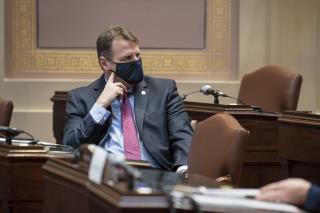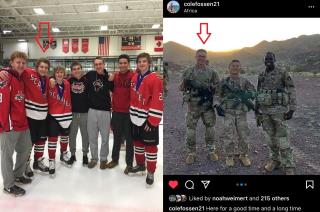Capitol Update Weeks 7 & 8
It’s full steam ahead this session as committee, floor session and constituent meetings are all day every day. We have multiple bills moving through the committee process and we are starting to have more debates on the Senate Floor. In addition, the financial forecast came out today and I’ll cover that later in this newsletter. One of our favorite things to do is to answer constituent emails. Please keep letting us know how you stand on the issues!

Budget Forecast
Today the budget forecast for the state budget biennium 2022/2023 was released. The outlook was better than expected, showing a $1.6 billion surplus. However, there is some reason to be cautious. The budget forecast for the future remains a question mark. For example, from the MMB website, "Improvements to the economic outlook have not been spread equally as unemployment continues to disproportionately impact lower-wage workers."
As always, we will continue to hear suggestions for tax cuts and funding existing programs. Because the state constitution requires a balanced budget, tax cuts are considered a type of "spending" in that when you decrease revenue, there must be an equal decrease in spending or an increase in taxes somewhere else. We want to be fiscally responsible. We have a few options for spending that could help those most affected by the pandemic. We can also look at expensive, but potentially helpful one-time tax cut like the $400 million Paycheck Protection Program loan forgiveness tax conformity for small businesses. We need to remember that while we keep our economy running, we must ensure safety in the workplace as well.
See the full February forecast HERE.
Agriculture and Rural Development Committee Review
Border to Border Broadband: The Agriculture and Rural Development Finance and Policy Committee spent this week talking about broadband and the MN border-to-border grant program. There is widespread support for additional funding so more Minnesotans can have high speed internet. This week's main question is how much funding the border-to-border grant program should receive in FY 22/23. The border-to-border grant program was established in 2014. Its purpose is to provide state resources that help build broadband infrastructure and provide broadband service in unserved areas of the state. Currently, the program is underfunded ($20 million per year) and will not be able to fully achieve the basic internet speed goals we have set for 2022 and 2026. Since 2014 applications for money have far exceeded available funding – and what’s more, COVID-19 has demonstrated even greater need.
I am a proud co-author of SF946, which would appropriate $150 million for broadband over the next two years. A portion would go to provide broadband service in underserved areas specifically. I am a big YES for this legislation as rural Minnesota is often the most impacted and underserved in terms of broadband. This would be a big benefit to not only our district but rural Minnesota as a whole. Also heard was SF 22 and SF 1186, and I’m looking forward to ironing out the details moving forward.
The Center for Rural Policy and Development: I am a YES on SF1070 and I’m proud to be a co-author on the bill. SF1070 appropriates $400,000 in FY22-23 for the Center for Rural Policy and Development, which is a non-partisan, not-for-profit policy research with its mission set to benefiting Minnesota by providing unbiased information from a rural perspective. Their most recent studies on rural workforce and the childcare shortage have been a tremendous resource at the legislature to identify needs in Greater MN. You can find those most recent reports and others here:

Time sure can fly. A constituent of ours, Cole Fossen, is now serving our country in the military in Africa. I first met Cole when I coached him in 4th grade football. The picture on the left shows him celebrating a boys section hockey championship for Mankato West in 2016. It was great to hear from Cole this week and everyone is immensely proud of him today. Cole, thank you for serving our country. We all look forward to seeing you come home to southern Minnesota when your work is done.
SD19 in the News
Capitol Update: Week 7
Capitol Update: Week 8
|

Vaccine Update: Changing Phases
At 12:15pm on Thursday, Governor Walz announced guidance on vaccinations and the future phases. The state will continue to focus on adults age 65 and older until a minimum of 70% of that group has been vaccinated. As of Thursday, more than 43% of have been vaccinated.
As the state receives more vaccine supply from the federal government, we will be able to continue distributing them to our communities. At the current rate, we should have 70% of our state's seniors vaccinated by April and should be able to move forward to the next phase focusing on high-risk medical conditions and targeted essential workers.
Be sure to know when you are available to receive a vaccine by signing up for the Vaccine Connector.
Who's getting vaccinated when? Check out the full vaccine schedule priority schedule HERE.

Energy and Utilities Senate
Committee Review
Attempts to Remove CIP: Yesterday, we heard SF992, which is a proposal by the Senate majority party to get rid of the Energy Conservation Improvement Program (CIP). To say the least, testimony in opposition to the bill was strong and came from many voices. The CIP program incentivizes energy efficiency through the use of electric utility rebates and is high utilized. It is one of the state's most effective energy programs. It also estimated that this program has created $11 billion in new economic activity in the last 30 years, created around 48,000 jobs right here in Minnesota, and saves consumers and businesses millions of dollars in energy costs each year.
The bill authors have offered to eliminate the CIP with no plan or expectation to replace. This is something I am not supportive of and will be a no vote. It does not make sense to get rid of a successful program that saves Minnesotans money and its elimination only serves to hurt low-income Minnesotans as well as our small rural communities.
Minnesota Nuclear Power Plants: On Tuesday, we heard SF225 which seeks to remove the prohibition on new nuclear power plants. While the author stated that the moratorium currently in place hurts and delays the goal to become carbon neutral by 2050, I would argue the opposite. The current moratorium doesn't stop Xcel Energy (the only MN utility with nuclear plants) from submitting future plans as they can still go through the current process and it is important that we understand issues with nuclear energy, mainly, the cost and the storage of nuclear waste.
Pre-emptively removing the moratorium for expensive energy that MIGHT happen is a more difficult sell.

This week I had an op-ed featured in the Star Tribune with Representative and House Energy Committee Chair Jamie Long. You can view the op-ed HERE.
Co-Authored Legislation
In the Minnesota Senate there can be up 5 authors on a bill (1 chief-author and 4 co-authors). Co-authoring a bill typically signals strong support for the language in the bill, and willingness to work on an issue with the chief-author. Here are some of the bills I am a co-author of.
SF704 appropriates $60,000 in fiscal year 2020 from the coronavirus relief federal fund to the commissioner of agriculture for additional farm advocate services in response to the COVID-19 crisis. We currently have about 10 farmer advocates and at the request of MDA, we are working towards funding a new position. I would like to see this funding continue indefinitely as farmer advocates are worth every dime they are paid and then some. On issues like mental health, I say don’t ask what it costs, ask what it pays.
SF776 would expand medical assistance coverage to community-based service coordination in jails. An in-reach community-based service coordination consists of a community-based worker with training, knowledge, and the ability to access adequate services (housing, transportation, chemical and mental health treatment, employment, education, etc.) to help transition an individual back into the individual’s living environment during their discharge or post arrest prior to incarceration. The purpose is to reduce the individual’s need for readmittance to a health care facility or reincarceration, which is costly to the state and delivers worse results than community based services.
SF1000 is a bill appropriating money for clean water initiatives and infrastructure and authorizing the sale and allocation of state bonds. While we most likely won’t see a bonding bill until next year, our state needs to continue to make strong investments in our water infrastructure, especially in Greater Minnesota.
SF640 would broaden the requirements for an insurer to obtain a salvage title to cover all vehicles. A person who owns a late-model (five-years old or newer) or high value vehicle (worth over $9,000 before being damaged or an older vehicle having a gross weight of over 26,000 pounds) and receives a total loss settlement from an insurer must apply for a salvage title. This bill is important for consumer safety and, while doesn’t prevent anybody from purchasing one of these cars, it gives more information to the consumer purchasing a vehicle that could have been in a terrible accident.
Moving Forward
First legislative deadline is on Friday, March 12th. That means that policy legislation needs to have passed through all required committees in either the Senate or the House. Stay tuned for updates on my legislation.
As always, keep the calls and emails coming. I truly believe we receive a strong level of constituent input compared to other offices and that helps me represent our district better. Thank you. I'm back in North Mankato for the weekend and I hope to see you around.
CONTACT INFORMATION
Senate Homepage
- Member Bio
Stay up-to-date by following my office on social media:
- Facebook.com/SenatorFrentz
- Twitter.com/NickAFrentz
Our next newsletter will be sent out Friday, March 12th .
If you have any questions, or you’d like to voice your opinion on an issue, please feel free to send a message to Sen.Nick.Frentz@Senate.MN
For appointments or schedule related inquiries, please call or send an email to my Legislative Assistant, Justin Emmerich. You can reach him at Justin.Emmerich@Senate.MN or 651-296-6153
|